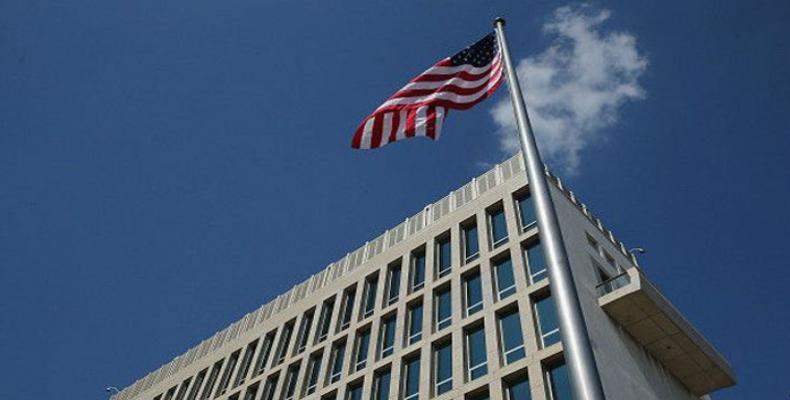London, May 30 (RHC)-- The most senior scientist in Cuba has called on his counterparts in the US and Canada to assess claims that mysterious attacks in Havana left American and Canadian diplomats with inexplicable concussion-like brain injuries, reports The Guardian.
Luis Velázquez, a neurologist who was recently appointed president of the Cuban Academy of Sciences, has asked the US and Canadian national science academies for a joint scientific inquiry to examine the evidence behind the alleged attacks.
The move reflects a growing sense of frustration in Cuba that the country is being blamed for harming foreign embassy staff even as governments and independent experts remain baffled as to what form of attack could have made the diplomats ill.
Some scientists have questioned whether attacks even took place and say the wide range of symptoms reported by the embassy staff could be explained by a number of common medical conditions, or be driven by psychological factors in a high-stress environment.
The inquiry Velázquez has called for would see some of the most eminent scientists in the world pore over the evidence to date with the aim of better understanding what, if anything, happened to the affected individuals. The US National Academy of Sciences confirmed the approach but declined to comment further.
The US slashed the number of staff at its Havana embassy and expelled 15 Cuban diplomats last year after 24 American staff and family reported feeling unwell with headaches, dizziness and problems with their eyesight, hearing, sleep and concentration. Many said their ailments came on after they heard strange noises that ranged from grinding and cicada-like chirps to the buffeting caused by an open car window. While unnamed US officials claimed in media reports that the diplomats were victims of “acoustic attacks,” an FBI investigation found no evidence that sonic weapons had been used.
Last month, Canada said it would call home the families of diplomats at its embassy in Havana, where 10 staff have reported similar symptoms. A spokesperson for Global Affairs Canada said an investigation into the cause was ongoing. “There have been no new incidents since the early fall of 2017,” they said. “Diplomatic families who have returned to Canada, however, have continued to experience symptoms.” Last week, the US issued a health warning to its citizens in China after one of its consulate staff experienced the same types of symptoms to those in Cuba.
A formal assessment of the American diplomats’ health commissioned by the US government was published in March by doctors at the University of Pennsylvania. The preliminary report in the Journal of the American Medical Association describes a new syndrome that resembles persistent concussion in people who have not received blows to the head.
But in a letter published in the Journal of Neurology, Sergio Della Sala and Robert McIntosh, both neuroscientists at the University of Edinburgh, claim the US report is seriously flawed.
Della Sala said much of the evidence the doctors used to propose a new concussion-like syndrome came from six diplomats who each took 37 cognitive tests. The tests looked at visual and auditory attention, working memory, language, reasoning, movement and other cognitive abilities.
In their report, the US doctors reveal that all six embassy staff who had the full battery of tests had some brain impairment or another. But Della Sala and McIntosh say anybody who took the tests would have been classed as impaired.
They point out that it is standard practice with cognitive tests to measure people’s performance against others in the population. Often, a person has to score in the bottom 5% to be considered impaired. But the US doctors set the threshold at 40%, meaning that by definition, four in 10 who take the test will be “impaired”.
Della Sala and McIntosh ran a simulation that looked at the probability of passing all 37 tests when the threshold for failure was set so high. “The chances that somebody will be without an impairment is zero,” Della Sala said. “We ran the simulation 1,000 times, and never, ever is there one single individual who appears to be normal. They are all classed as impaired.”
He added: “I’m not denying that they may have discovered a new syndrome, but the point is that the evidence they have provided is nonscientific. The paper is faulty. Even if the results are preliminary, a threshold that verges on half the population is unheard of. I cannot see how any reviewer could have looked at the data and said they are fine. This is not a little thing. It is a threshold unknown in science or clinical practice.”
In their Journal of Neurology paper, the scientists conclude: “With the criteria used, the neuropsychological symptoms of the proposed new syndrome have a worrying lack of specificity: everybody is affected.”
Mark Cohen, a professor of neurology and pioneer in functional brain imaging at University of California, Los Angeles, said there was insufficient evidence to link the diplomats’ health problems to the sounds they heard. “These are symptoms which are typical of many, many causes,” he said. “It is an incautious leap to presume that the cause was related to the reports of sounds heard by these diplomats.”
Neither the US State Department nor representatives from the University of Pennsylvania responded to requests for comment.
(Article published by The Guardian on May 29, 2018)


